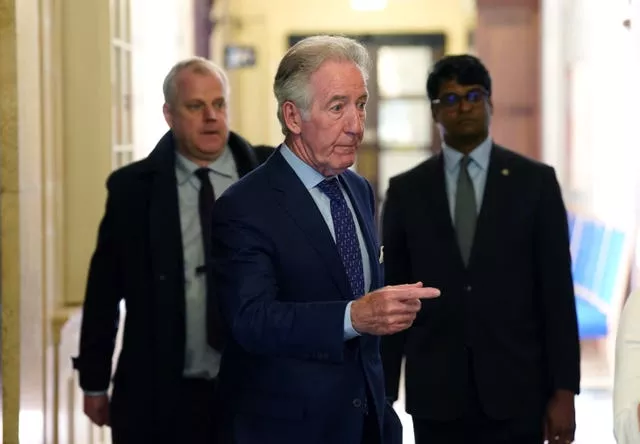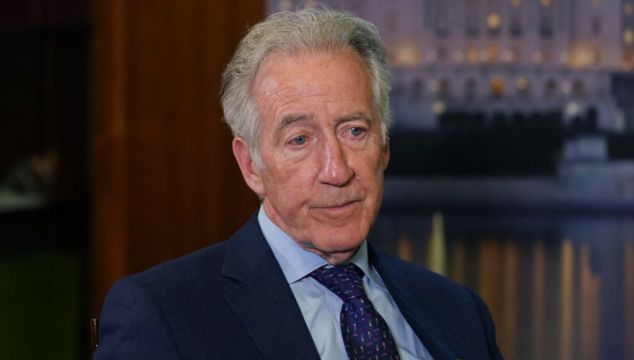The impasse over Brexit’s Northern Ireland Protocol is “not a real crisis”, a senior US Congressman has insisted.
Richard Neal said the deadlock was instead a “problem to be solved” after he and fellow members of a Congressional delegation held talks with Stormont’s five main parties in Belfast.
Powersharing in Northern Ireland is on ice after the DUP refused to re-establish a devolved executive following the recent Assembly election in protest at arrangements that have created economic barriers on trade between Great Britain and Northern Ireland.
Mr Neal, who is chairman of the influential House of Representatives’ Committee on Ways and Means, has faced intense unionist criticism for describing the protocol dispute as a “manufactured issue”.

On Thursday, Mr Neal acknowledged he could have “picked a more artful term” to describe the impasse but he said “no harm” was intended by the comment.
“Anybody that would suggest that it was maliciously intended would be misguided,” he said.
Mr Neal suggested the protocol was a “slight bump” and “momentary challenge” in the political journey Northern Ireland has been on over the last three decades and paled in comparison to obstacles overcome during the peace process.
“To describe the protocol issue as a crisis is inconsistent with the success we’ve had over 25 years of the Good Friday Agreement,” he said.
“I still don’t think it’s a crisis. I think it’s a problem to be solved, duly negotiated – much of it emanates from Brussels and London but it should include the people of Northern Ireland in the discussion and deliberation.”

He added: “I think that every time we simply use the word crisis to describe everything, then we forget what a real crisis means, and I just continue to believe this is not a real crisis.”
DUP leader Sir Jeffrey Donaldson heavily criticised Mr Neal after meeting him at Parliament Buildings, describing the delegation’s fact-finding mission as the “most undiplomatic visit” he had ever seen to Northern Ireland.
Mr Donaldson branded Mr Neal’s language in the earlier part of the week as “unhelpful”, adding it “displays an alarming ignorance of the concerns of unionism”.
However, he said he heard a “more realistic approach” during the meeting with the delegation at Stormont on Thursday.
Mr Neal, who said his meeting with the DUP went “very well”, said unionist apprehensions about the protocol were “legitimate”.
“I think I was very clear in the meeting that I had with the DUP that while I don’t want to see a hard border on the island, I also pointed out to them that I understood the apprehension that they have raised about a border in the Irish Sea – I thought that they were very receptive to that argument,” he said.
Mr Neal added: “I would like to see the issue negotiated.
“I thought that the apprehension that they raised was legitimate. I think that there is an acknowledgment that there are some problems with the protocol.
“We want to see them smoothed over and repaired.”

Sinn Féin’s Stormont leader Michelle O’Neill, who would be in line to become first minister if the DUP dropped its boycott of the devolved institutions, said the delegation’s visit was welcome.
“For many years we have enjoyed the support of successive American administrations in terms of our peace process, so I very much welcome the fact that we have such a strong delegation visiting here,” she said.
“(They are) big supporters of the peace process, big supporters of the Good Friday Agreement and the need to protect that agreement.
“We have had a very good meeting with them in terms of our shared objective which is to have this Executive and Assembly up and running, supporting people through the cost-of-living crisis, addressing our health service needs.”
Meanwhile, Mr Donaldson revealed his party confronted Mr Neal about his use of the term “planter” to refer to unionists in Northern Ireland.
He said that during the meeting the DUP compared the stand-off over the protocol to a well-known event in the history of the America revolution, the Boston Tea Party.
Mr Donaldson said that when revolutionaries pushed tea chests into the harbour in Boston in 1773 the mantra was “no taxation without representation”.
“And I reminded Congressman Neal and his colleagues that this too is our mantra: that today Northern Ireland is subjected to laws and taxes into which it has no say, that not a single member elected to this Assembly can influence many of the laws that now oversee how we conduct trade in our country because they are imposed by the European Union, and there is no democratic accountability to this institution or any democratic institution in this country,” he said.

Stormont was the last stop on the US delegation’s visit to the island of Ireland.
The bipartisan delegation has also held meetings in London and Brussels during its protocol-focused mission.
Many unionists and loyalists are vehemently opposed to the protocol, claiming its requirement for checks on goods moving across the Irish Sea has undermined Northern Ireland’s place in the United Kingdom.
The Ways and Means committee would have a key role in approving any future trade deal between the UK and US, and Mr Neal has made clear such an agreement would be at risk if the London government pressed ahead with its plan to unilaterally scrap parts of the protocol.
He said a trade deal was “very desirable” but added: “As part of that, we want to make sure that that agreement is reconciled with the idea that we are a co-guarantor of the Good Friday Agreement and we don’t want to see it jeopardised.”
Mr Neal said his position was “entirely” in line with the US administration in Washington DC.
He insisted his role and that of the US was as an “honest broker”.
Mr Neal said the issue of whether the Biden administration should appoint a special envoy to Northern Ireland was a matter for the US president to decide on.
“I actually asked the last president (Trump) to do that, to appoint an envoy – he told me he was going to but he did not in the end,” he added.
Asked what he felt the prospect of a visit by President Joe Biden to Northern Ireland might be, Mr Neal said he would like to see a presidential presence at events to mark next year’s 25th anniversary of the Good Friday Agreement.
He said: “I would hope that British prime ministers, taoisigh from the Republic of Ireland, American presidents, American members of Congress, members of the Dail, senate and certainly the Assembly would all gather here for the 25th anniversary and say ‘hooray, that challenge 30 years ago should remind the world of what again people of goodwill can do’ and they did it.”
Members of the Loyalist Communities Council met Mr Neal to discuss the Northern Ireland Protocol on Thursday.
In a statement, the group said that the US could “no longer be viewed as honest brokers” in Northern Ireland and that the Biden administration “has openly taken sides with the nationalist position”.
They added: “Congressman Neal was asked to use his influence on Capitol Hill to require the ending of the Irish Sea Border just as much as he opposed any hard border on this island.”







